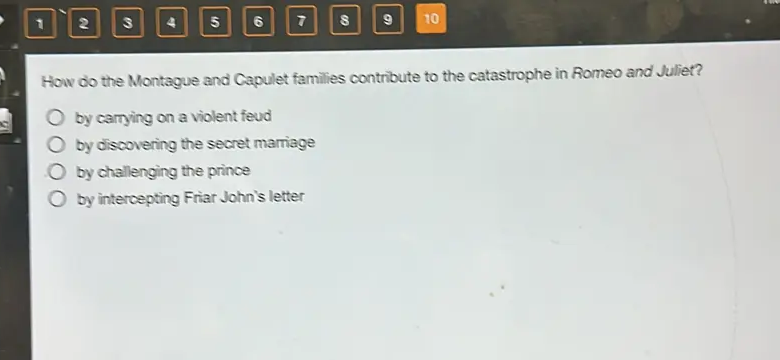How Do the Montague and Capulet Families Contribute to the Catastrophe in Romeo and Juliet?

In William Shakespeare’s classic play Romeo and Juliet, the longstanding feud between the Montague and Capulet families is central to the tragic ending. This bitter rivalry creates a hostile environment that makes it nearly impossible for Romeo and Juliet to be together openly. The enmity between the families leads to violence, secretive actions, and a chain of miscommunications—all of which contribute directly to the ultimate catastrophe of the lovers’ deaths.
The Role of the Feud
The feud between the Montagues and Capulets is the backdrop against which the entire play unfolds. This conflict, although the origin is never clearly explained, is deeply ingrained in both families. It has caused not only tension but also outright violence, as seen in the frequent street brawls between the younger members of the families. In the very first scene, a fight breaks out between the servants of the Montagues and Capulets, showing how deeply rooted the hatred is. This constant hostility makes it difficult for Romeo and Juliet to even consider a future together, prompting them to take drastic, secretive measures like marrying in secrete Impact of Parental Pressure Both the Montagues and the Capulets play a direct role in pushing their children into decisions that ultimately lead to their demise. For instance, Juliet’s father, Lord Capulet, pressures her into marrying Paris, a suitor she does not love. When Juliet refuses, he reacts with anger and threats, leaving her feeling isolated and desperate . This prces Juliet into a situation where she feels that her only option is to take a drastic measure—faking her death to escape the marriage.
On the Montague side, Romeo’s impulsive behavior is partly a result of the environment of hostility and the lack of open communication with his parents. The Montagues are more focused on maintaining their family honor than understanding the emotional turmoil Romeo faces due to his love for Juliet and his role in the ongoing feud.
Read Also: Which Diagram Could Be Used to Prove △ABC ~ △DEC Using Similarity Transformations?
Violence and Tragedy Escalated by the Feud
The feud also leads directly to several key violent events in the play that propel the tragedy forward. For example, Tybalt, a Capulet, confronts Romeo, who initially refuses to fight him due to his secret marriage to Juliet. However, when Tybalt kills Romeo’s friend Mercutio, Romeo retaliates and kills Tybalt, leading to his banishment from Verona . This banishment series of miscommunications, particularly when Romeo is unaware that Juliet’s death is only a ruse. The constant atmosphere of conflict and secrecy means that crucial information is not shared when it matters most, contributing to the tragic conclusion.
The Role of Miscommunication and Secrecy
The rivalry between the families forces Romeo and Juliet to hide their love and marriage, relying on secrecy to stay together. Because they cannot openly communicate their intentions or feelings, misunderstandings arise. For instance, Juliet’s plan to fake her death is kept secret from Romeo, who believes she is truly dead when he finds her in the tomb. Despairing, he takes his own life. When Juliet awakens and finds Romeo dead beside her, she also takes her own life. This tragic ending could have been avoided if the families’ conflict had not forced them into secrecy .
Conclusion: The Ro the Tragic End
In Romeo and Juliet, the Montague and Capulet families’ longstanding feud sets the stage for misunderstanding, violence, and the need for secrecy, all of which contribute to the tragic ending. The deep-seated hatred between the families isolates Romeo and Juliet, forcing them into desperate actions. Their deaths ultimately become a catalyst for reconciliation between the Montagues and Capulets, but it comes at a tremendous cost. Thus, the catastrophe in Romeo and Juliet is not just a result of the actions of the young lovers but also a product of the environment shaped by their families’ longstanding enmity .




